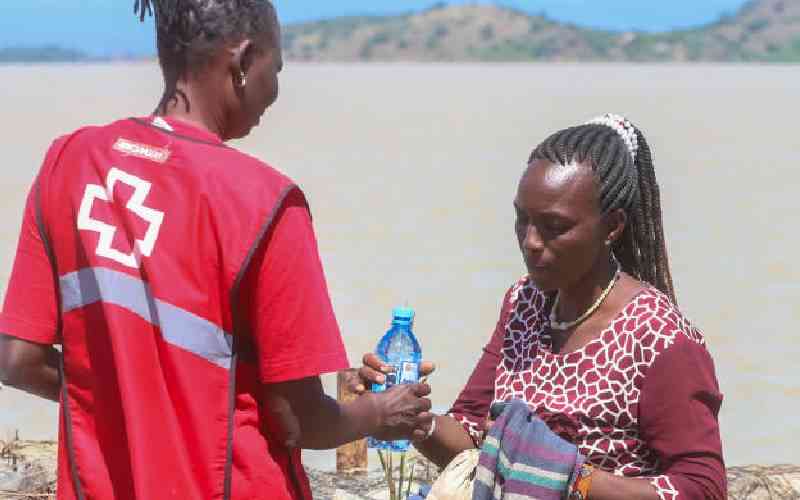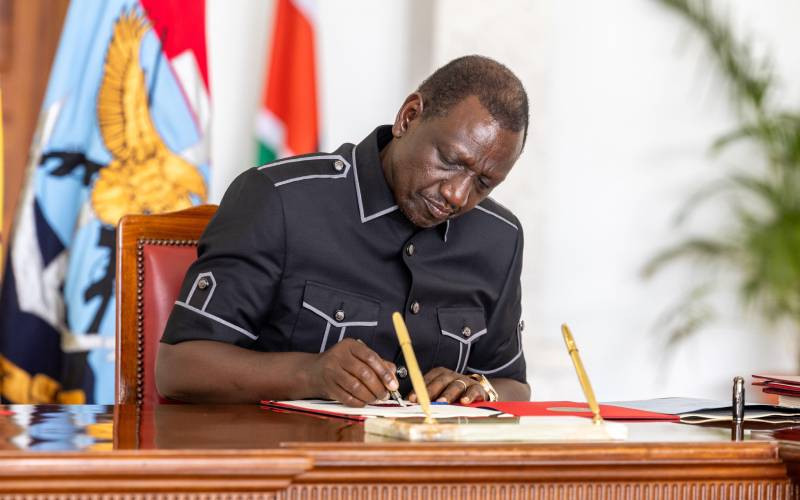Kenya: Kenya is expected to defend its proposals to radically change the Rome Statute at an ICC committee hearing in October.
Kenya, alongside four other ICC members proposing amendments to the Statute, have been given appointments with the ICC Assembly of State Parties Working Group on Amendments to clarify aspects of their proposals.
An ASP secretariat meeting, known in ICC parlance as ‘the Bureau’, held on July 18, was told that various countries had sent questions to Kenya and the other four countries – Belgium, Mexico, South Africa and Trinidad & Tobago.
“Some proponents had indicated their intention to revert with answers at the next meeting of the Working Group on Amendments (WGA), which would take place in October,” minutes of the bureau meeting seen by The Standard on Sunday indicate.
The WGA is chaired by Ambassador Paul Seger of Switzerland. According to the minutes, the group is giving priority to amendments submitted through ASP’s Study Group on Governance. It is considering any other proposals, including Kenya’s, as ‘secondary items’.
Kenya is proposing five amendments, which were distributed to UN members on March 13 by Secretary General Ban Ki Moon.
The proposed amendments affect Article 63 on trial in the presence of the accused, Article 27 on irrelevance of official capacity, Article 70 on offences against administration of justice, Article 112 on independent oversight and Article 5 on complementarity.
“Article 63(2) envisages a trial in absence of the accused in exceptional circumstances. The Rome Statute does not define the term ‘exceptional circumstances’, and neither are there case laws to guide the Court on the same,” the proposal on Article 63 says.
Kenya wants the article amended to say that “notwithstanding article 63(1), an accused may be excused from continuous presence in the Court after the Chamber satisfies itself that exceptional circumstances exist, alternative measures have been put in place and considered.”
Such alternative measures would include, but not be limited to, changes to the trial schedule or temporary adjournment or attendance through the use of communications technology or through representation of Counsel, Kenya suggests.
Such absence shall be considered on a case-by-case basis and limited to that which is strictly necessary.
“The Trial Chamber shall only grant the request if it determines that such exceptional circumstances exist, and if the rights of the accused are fully ensured in his or her absence, in particular through representation by counsel and that the accused has explicitly waived his right to be present at the trial,” the Kenyan proposal reads.
Article 27 says the statute shall apply equally to all persons without any distinction based on official capacity. It also trashes national or international immunity or special procedural rules, which may attach to the official capacity of a person charged at the court.
Kenya is proposing to amend the article to explicitly state that “serving Heads of State, their deputies and anybody acting or entitled to act as such may be exempt from prosecution during their current term of office”.
Stay informed. Subscribe to our newsletter
Kenya argues that Article 70 on offences against administration of justice presumes that such offences, save for 70(1) (f), can be committed only against the Court.
“Noting the current situation in the Kenyan cases, especially Trial Chamber V (b), this article should be amended to include offences by the Court officials so that it’s clear that either party to the proceedings can approach the Court when such offences are committed,” the proposal says.
On Article 112, Kenya wants the Independent Oversight Mechanism operationalised and empowered to “carry out inspection, evaluation and investigations of all the organs of the Court”. The amendment targets the Office of the Prosecutor, which, according to Kenya, has historically opposed the scope of authority of the IOM.
Finally, on Article 5 on complementarity, Kenya wants the preamble of the statute amended to recognise complementarity to regional criminal jurisdictions. Currently, it only provides for complementarity at national jurisdictions.
South Africa’s amendment to Article 16 targets the UN Security Council, which has been accused of sitting on deferral requests.
The amendment proposes to empower the UN General Assembly to act on deferral requests where the UNSC fails to act within six months.
Trinidad & Tobago proposes to amend Article 5 of the Rome Statute to include the crime of international drug trafficking. Mexico’s proposal targets Article 8 and entails criminalisation of the use of nuclear weapons in a war.
And Belgium’s proposed amendment also affects Article 8 and proposes to criminalise use of poisoned weapons, poisonous gases and use of certain types of bullets in warfare. All the amendments, apart from Kenya’s, were proposed in 2009.
Amendments to the Statute started seven years (July 2009) after the entry into force of the Rome Statute (July 2002). Any state party is free to propose amendments. Once proposals are made, the secretary general of the UN is required to circulate them to all state parties.
The threshold for amendments at the ASP is two thirds of all members. The statute, however, gives consensus first priority, failure to which the matter goes to vote.
Thereafter, states will have to ratify the amendments individually, and only after they hit the seven-eighth threshold shall the proposals come into force. This means Kenya must wait until 106 states ratify the amendments for it to enjoy the fruits of the proposals.
Amendments to Articles 5, 6, 7 and 8 do not have to wait 106 members’ support to take effect. They enter into force for those states that have accepted them one year after the states deposit their instruments of ratification.
An amendment to Article 8, which was adopted by ASP in 2010, entered into force in the state of San Marino on September 2012. Since then, 16 other states have accepted and ratified it.
Another amendments on text of crime of aggression has only been accepted by 14 states. An agreement on privileges and immunities of the ICC, which entered into force on July 22, 2004, has only attracted 72 state parties so far. Kenya signed the Rome Statute on August 11, 1999, but it was not until March 15, 2005, that it ratified the decision.
Meanwhile, Kenya has continued to exert its influence on the operations of the court. Kenya’s high commissioner to the Netherlands, Rose Makena Muchiri, has been appointed to a panel that will recruit the next head of the Court’s Independent Oversight Mechanism.
Kenya has previously complained about effectiveness of IOM, as reflected in the proposed amendments. Muchiri will work alongside Ambassadors James Lambert (Canada), Nikola Kolev (Bulgaria), Jaime Victor Ledda (Philippines) and Jorge Lemcke (Guatemala) in identifying the next head of IOM.
The post was previously headed by Ambassador Jorge Urbina Ortega (Costa Rica), whose term at The Hague has ended.
 The Standard Group Plc is a
multi-media organization with investments in media platforms spanning newspaper
print operations, television, radio broadcasting, digital and online services. The
Standard Group is recognized as a leading multi-media house in Kenya with a key
influence in matters of national and international interest.
The Standard Group Plc is a
multi-media organization with investments in media platforms spanning newspaper
print operations, television, radio broadcasting, digital and online services. The
Standard Group is recognized as a leading multi-media house in Kenya with a key
influence in matters of national and international interest.
 The Standard Group Plc is a
multi-media organization with investments in media platforms spanning newspaper
print operations, television, radio broadcasting, digital and online services. The
Standard Group is recognized as a leading multi-media house in Kenya with a key
influence in matters of national and international interest.
The Standard Group Plc is a
multi-media organization with investments in media platforms spanning newspaper
print operations, television, radio broadcasting, digital and online services. The
Standard Group is recognized as a leading multi-media house in Kenya with a key
influence in matters of national and international interest.








